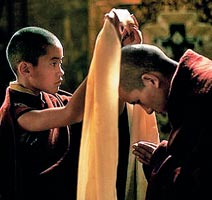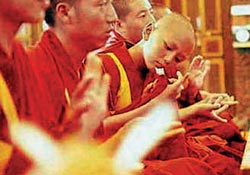
The Message of ‘Maithree’ in movies in ColomboBy Susitha R. FernandoA rare opportunity to see world renowned Buddhist films will be in Sri Lanka when a festival of cinematic creations related to themes of Buddhism begins at the Elphinstone theatre in Colombo this week. For the first time in the history of organising of film festivals in Sri Lanka, screening is organised by the Buddhasasana Secretariat of the Ministry of Religious Affairs. The funds from the festival will be used to renovate temples in rural areas. The festival which continues from June 18 to 22 will have two screenings with a school show at 9.30 am and the public show at 6 pm. Speaking on the festival Ven. Authuraliye Rathana Thera said, the festival was the result of a discussion held with the diplomats of the Buddhist countries recently.
"The meeting which was held to promote friendship and unity among these countries wanted to share their cinematic experiences which discusses Buddhist philosophy deeply," Ven. Rathana Thera said. ‘The cause of the project is also important as the total funds will be used to renovate temples in the rural and difficult areas’ he added. The list of films which includes award winners are, the Hindi film 'Amrapali' by Lekh Tondon (June 18), 'The Cup' written and directed by a monk Khyentse Norbu (June 19), 'Kundun' (June 20), Milarepa by the Italian director Liliana Cavani (June 21) and "Khun" (June 22). Starring Sunil Dutt and Vaijayantimala in the lead ‘Amrapali’ shows the King's transformation through the Buddhist message of love. This film has a theatrical narrative, stage decor and there is a concentration of dialogue.
Amrapali advocates the Buddhist doctrine while portraying the undesirability of warfare. The film has memorable song and dance numbers. Based on true events 'The Cup' narrates about two boys who are sent, with much hardship and danger, to a monastery in exile in the picturesque foothills of the Himalayas. As they receive their ordination and orientation into a monastic life, a whirlwind of events not usually associated with the austere atmosphere of the monastery intrudes on their routine - how can they get to watch the World Cup Finals? Soon the chants of the young monks are a vehicle for soccer scores instead of prayers. Caught while sneaking out to watch a semi-final match, they are afraid of expulsion, but they are even more afraid that they'll miss a match. A brazen plan is hatched that pits tradition against technology as the boys try to get a television and satellite dish into the monastery. The Tibetans refer to the Dalai Lama as 'Kundun', which means 'The Presence. He was forced to escape from his native home, Tibet, when communist China invaded and enforced an oppressive regime upon the peaceful nation of Tibet. The Dalai Lama escaped to India in 1959 and has been living in exile in Dharamsala ever since. In 1937, in a remote area of Tibet close to the Chinese border, a two year old child is identified as the reincarnation of the Dalai Lama, the compassionate Buddha. Two years later, the child is brought to Lhasa where he is schooled as a monk and as head of state amidst the colour and pageantry of Tibetan culture. The film follows him into adulthood: when he is 14, the Chinese invade Tibet and he is forced into a shaky coalition government; he travels to China to meet with a cynical Mao; and, finally, in 1959, ill and under siege, he flees to India. Throughout, he has visions of his people's slaughter under Chinese rule. 'Milarepa' is a rare film which chronicles a famous 11th century Tibetan sinner/saint in an ambitious story set first in contemporary Italy. Milarepa was an epic life that has been an inspiration for nearly a millennium. |
|| Front
Page | News | Editorial | Columns | Sports | Plus | Financial
Times | International | Mirror | TV
Times | Funday
Times || |
| |
Copyright
2007 Wijeya
Newspapers Ltd.Colombo. Sri Lanka. |

